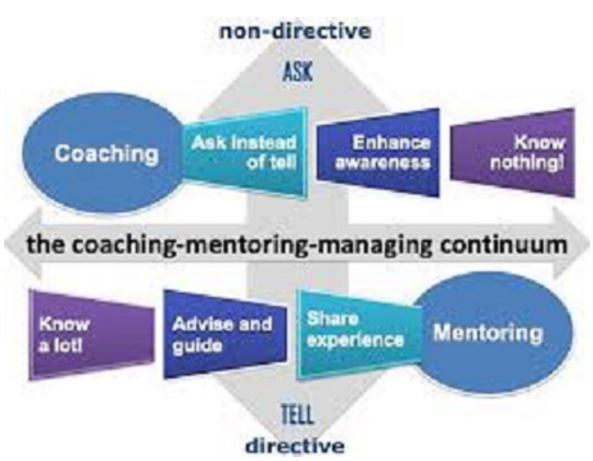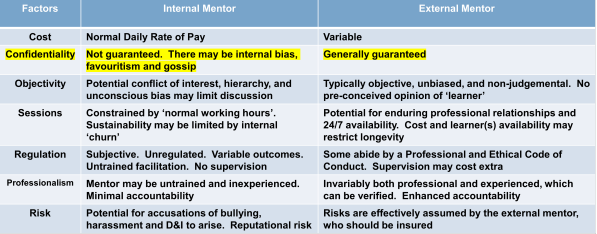Why would I need a mentor?
By Richard Gadd
The purpose of this article is to inform the reader of the potential benefits, sourcing, management, and pitfalls of employing a mentor in order to help their future decision making and development.
False Perceptions
The first recorded Mentor was Athena, the goddess of wisdom. Since then, there has been a general acceptance that mentoring is when one person uses their wisdom to help another person build theirs, although disagreements remain about both the definition and delivery of mentoring
For example, the US Model of Mentoring is predominantly a “one-way learning process”.
Many other false perceptions exist, which continue to erode levels of confidence and engagement:
- Employing an External Mentor is an enduring and unaffordable commitment
- All External Mentors are motivated by money
- All Internal Mentors are motivated by self-interest and are biased
- I don’t like being told what to do
- I already ‘follow’ a ‘Role Model’ on #socialmedia
- Mentoring is typically the privilege of senior executives
- All Mentors think they’re better than me
- If I need advice, I’ll ask “my mate Gordon” (Graham Fellows, 1978)
What is Mentoring, and How Does it Differ from Coaching?

Mentoring is traditionally more ‘push’ than ‘pull’, as is coaching
With the US Model of Mentoring being one extreme example, mentoring is traditionally more directive than coaching, although the degree of directness may vary with its primary purpose (organisationally sponsored versus learner developmental sponsored), and personalities (learner versus mentor).
In general, most good mentors are more experienced, often older, than their learner. They have invariably faced many of the challenges currently facing the learner, although not necessarily in the same Sector, and are well placed to offer unbiased advice over a prolonged period of time.
Ideal Process Management
The Description of anything as “ideal” is hugely subjective of course and depends upon whose perspective an activity is being judged. Generally speaking however, one might expect a potential mentoring relationship to be established as follows:
- In most instances, the learner rather than their ‘parent organisation’ identifies their actual rather than their perceived learning need
- Exceptionally, an organisation may choose to employ a mentor to improve the performance of one or more employees in which case the organisation will become the ‘primary stakeholder’
- The learner will typically identify a small number of potential mentors, ideally those offering one or more free ‘Discovery Calls’. ‘Discovery’ is outlined below.
- The ‘Discovery Call’ should be used by both the learner and potential mentor to assess the feasibility of an enduring professional relationship
- If the feasibility of an enduring professional relationship cannot be established, no matter the cost attractiveness, it is highly recommended that the learner and mentor do not work together
- Only once a suitable ‘fit’ has been established should costs be discussed
- The duration, frequency, and location of future mentoring sessions can then be agreed
- At the initial meeting the learner should anticipate being invited to consider such subjects as boundaries, permissions and communication strategy
- The leaner should also anticipate being invited to receive and give constructive feedback
What are the Potential Benefits of Mentoring
- Confidence building and promotion of a growth mindset
- Encouragement of self-learning and reflective practices
- Development of objective and impartial feedback
- Transfer of responsibility for learning progression to Mentor
- Promotes management of emotions and resilience
- Increases levels of self-awareness and leadership skills
- Exploration of personal beliefs and values
- Enables to ‘learner’ to establish learning priorities
- Develops written and verbal communication skills
- Professional skills and performance enhancement, as directed by a ‘sponsoring organisation’

Building self-confidence and rapport
What Does Good Mentoring Look Like
The perception of anything as ‘good’ largely depends upon from whose perspective that judgement is being made. For example, most Financial Departments might equate ‘low cost’ with good, although that rarely satisfies the needs of the learner.
Individual learners may wish to consider the following attributes before deciding whether or not to describe a Mentor as ‘good’:
- How will the mentoring be delivered: F2F (in person), Remote (video), or telephone
- Will the Mentor help me set, pursue, and measure goals
- Will the Mentor hold me accountable
- Where is the Mentor from: internal or external (see below)
- Does the Mentor have the prerequisite Knowledge, Skills, Attitude (Motivation) and Experience
- Can the Mentor offer me a safe, non-judgemental, and good-humoured environment
- Is the Mentor professionally accredited or unaccredited
- Does the Mentor have any testimonials and/or recommendations, or evidence of delivering positive outcomes
- Is the Mentor affordable, particularly for sustainable commitment
- Might there be the potential for an enduring professional relationship, in which the Mentor is committed to my development
Comparison of Internal and External Mentors

Avoid making comparisons on cost alone
Sourcing an External Mentor
Like Coaching, Mentoring lacks both a single definition and regulatory body, because of which standards of practice are far more variable.
For those organisations and individual learners specifically looking for a professional External Mentor, there are a number of sources available:
- National Careers Service. Potentially more suited to younger learners
- National Guide on How to Find a Mentor. This article, published in the Guardian newspaper is more suited to those in career X Factor Mentor transition. Not all learners have to enter the X-Factor to secure a Mentor or make juvenile gestures!
- Market Research Society (MRS). Ideally suited to those in the Research Sector, although Membership Fees may apply
- British Council Offices (BCO). Offered a Mentoring Programme in Leeds in 2023 and may so again in future. Ideally suited for the Office Sector, potentially Virtual Assistants
- European Coaching and Mentoring Council (ECMC). This pro bono organisation, which also has a UK Branch, offers professional Mentors throughout the world
A search for “Professional Mentors in North Yorkshire” reveals more than 2.8M ‘hits’, and it’s not difficult to find an External Mentor closer to your place of work/residence. Similarly, most regional Local Enterprise Partnerships (LEPs) and Growth Hubs are an alternative source of business growth advice and support for those seeking business mentoring.
Lastly, most reputable mentoring training providers, such as the Institute of Leadership and Management (ILM) will also have a list of reputable and qualified External Mentors to consider.
Understand the Risks
Mentoring is typically a professional relationship between two adults. The same risks therefore exist that apply to most other types of human relationships. Nevertheless, there are certain precautions that a learner can take into to gain the most benefit from their mentoring experience:
- ‘Boundaries’, mutually agreed at commencement of the professional relationship, must not be breached. Once trust breaks down, the relationship becomes untenable, and should be terminated forthwith
- The roles of ‘mentor’ and ‘learner’ should be upheld at all times
- The Mentor should never be expected to act beyond the limits of their certified competence. For example, unless a mentor is suitably qualified to do so, they must refrain from giving any medical, psychological, safe-guarding, domestic, sexual, counselling, or marital advice and guidance. If they do so, they should be reported to their professional regulating body, and the relationship should be terminated forthwith
- Any good mentoring relationship requires mutual respect, selfless commitment, integrity, trust, and effective communications. Learners should be wary about one-sided, manipulative, or coercive relationships
- Learners must avoid becoming too dependent on their mentor
- Do not tolerate unconstructive, demeaning, or judgemental feedback
- The relationship should be terminated forthwith if ever confidentiality is breached
- Avoid using existing ‘chain of command’ and be mindful that Internal Mentors may be biased!
- Avoid being mentored in any environment in which you don’t feel safe. Consider using public spaces, purpose-built premises, and know what to do in an emergency
- Avoid accidental misunderstandings by asking for clarification or a summary of key findings
- Most mentors take their responsibilities, particularly the ‘duty of care’ to the learner, extremely seriously. Do not jeopardise the relationship by failing to apply yourself
- Avoid being filmed, photographed, or recorded without your written consent
- Know how to suspend or terminate any mentoring relationship in advance

Many purpose-built facilities provide the ideal mentoring environment
September 2023


